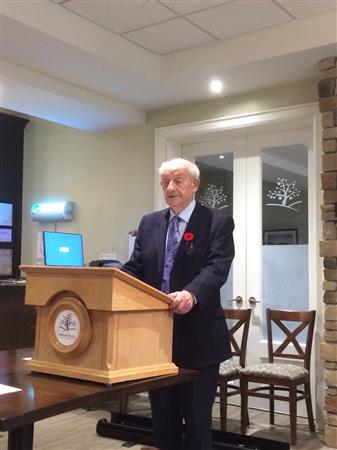
In honour of Remembrance Day our resident historian, Dr. Paul Clifford, shared some thoughts and memories. Paul was born in Britain in 1932 so he was a young lad for WWII. But, he was old enough to have vivid remembrances of that time. Paul survived the Blitz; many of his country did not. His comments, today, encouraged us to reflect upon not only those who served in uniform but also those who lived day by day and night by night as civilians.
In 1863, General Sherman immortalized the phrase “War is Hell”. One doubts he was the first to have that thought. However, since the American Civil War there continues to be wars that affirm Sherman’s pronouncement. We know of people who are able to recount their war experiences (Paul cited his cousin who served in North African and helped defeat Rommel) and we also know of people who are extremely reticent about their experiences (Paul had a cousin who was held in a Japanese POW camp). Heroism and horror sometimes walk hand in hand.
Paul reminded us of the devastation experienced by bombing – whether it be by prolonged shelling and blockade (Leningrad), by raining firestorm (Dresden) or by blinding nuclear bomb (Hiroshima). Be it all or enemy, war’s death and destruction took no prisoners. And while the World Wars are often top of mind on November 11, Paul listed the wars post 1945 – Korea, Falkland’s, Vietnam, Sudan, Bosnia, Iraq, and Afghanistan. And in all these both military and civilian personnel have paid with their lives.Paul urged us to search for peace and linked this to the mission of the Rotary Foundation – to promote peace in the world. As an international service organization, Rotary supports 6 peace centres throughout the world (in Europe, Africa, North America, Asia) and directly funds 130 Peace fellows per year.
Perhaps we will not abolish war but we must always remember: war is hell. Empathy should not be a “nationality”. All humanity is our kin.
Perhaps we will not abolish war but we must always remember: war is hell. Empathy should not be a “nationality”. All humanity is our kin.